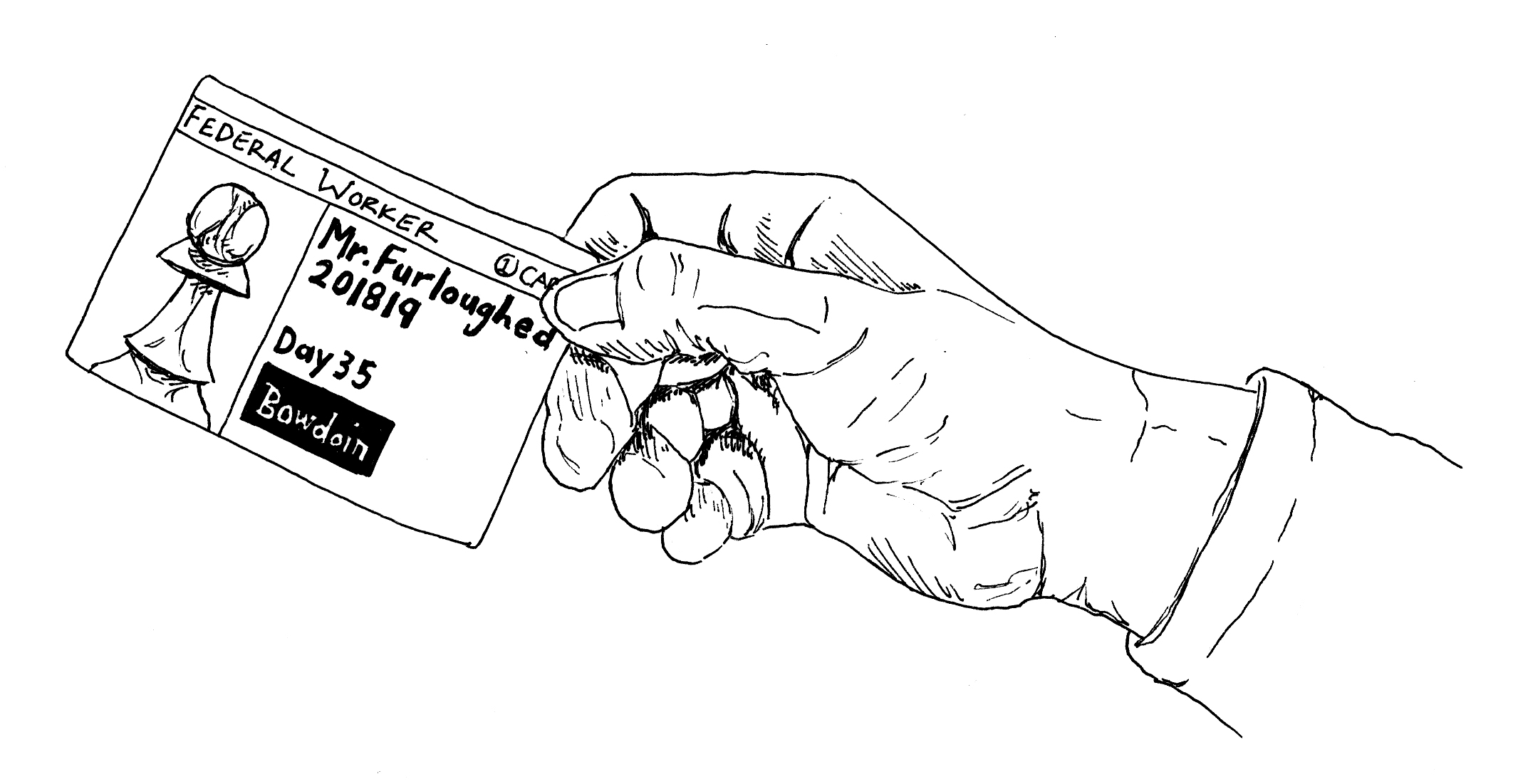A statement in solidarity with federal workers
January 25, 2019
 This
piece represents the opinion of the author
s.
This
piece represents the opinion of the author
s.
 Kayla Snyder
Kayla SnyderWe, members of the Bowdoin Labor Alliance, write this statement to publicly express our solidarity with federal workers struggling during these long weeks without pay due to the government shutdown.
Workers should not be exploited as political pawns; they are our friends, relatives, community members and peers. Many workers live from paycheck to paycheck, and are therefore falling behind on current financial obligations—rent, healthcare and car payments, education costs and the need to put food on the table—simply because of our president’s commitment to building a wall between the United States and Mexico, an explicit symbol of racism and white supremacy. This situation is one that all members of our society should condemn.
Trump’s proposed border wall functions only as a symbol of hate meant to deepen our nation’s political divide and advance an anti-immigrant, hyper-nationalist agenda. This wall, hundreds of miles long on a 2,000-mile border, would not even accomplish the administration’s own apparent—yet inconsistently voiced—goal to deter illegal immigration.
Migrants are not merely numbers, nor should they be framed as a threat to rally our president’s political base and unnecessarily racialize our politics. Immigrants founded our country and they have since been the backbone of American economic, cultural and political progress. Workers are not merely numbers either. Their labors and their lives merit the same respect, dignity and value as those of the highest office. Some 800,000 federal workers, integral to our economy, should not be $5,000 behind on their bills. They deserve better.
A society that ignores these facts is an oppressive one; a president who does so is a tyrant.
We are disappointed that Bowdoin College, our institution, has yet to provide a statement or take action on this issue. Abiding by the “Common Good” means not only stating our values, but also putting them into practice.
Thus, we call upon our College to:
1. Condemn President Trump’s proposed border wall and call upon his administration to immediately end this shutdown.
2. Allow federal workers in our community to access our top-notch dining services for the duration of the shutdown, while they live without paychecks.
3. Allow students with family members who are federal workers to delay tuition payments for the duration of the shutdown.
Doing so would expand upon the example set by College of the Atlantic in Bar Harbor, Maine which provided federal workers with a meal at no cost in their dining hall. Furthermore, local museums are opening up at no cost for Maine’s 10,000 federal workers, some Maine banks are offering them no-interest loans and numerous restaurants are providing much-needed meals for free.
Our proposed steps, however small, would ease the burden on some of our community members and allow Bowdoin students to more deeply engage with those whose often-hidden labor we depend upon.
Bowdoin taking action would also inspire similarly wealthy and influential institutions in our community, state and across the nation, to follow our lead.
Comments
Before submitting a comment, please review our comment policy. Some key points from the policy:
- No hate speech, profanity, disrespectful or threatening comments.
- No personal attacks on reporters.
- Comments must be under 200 words.
- You are strongly encouraged to use a real name or identifier ("Class of '92").
- Any comments made with an email address that does not belong to you will get removed.

Since this is an opinion piece, terms like “oppression,” “tyrant,” “racist,” and “white supremacy” are fair game.
What strikes me is the request/demand that the College open its dining halls to federal workers who didn’t receive paychecks temporarily due to the partial government shutdown. There are two possible approaches to feeding these people. One is to divert the College’s resources from some other purpose to feeding these people. The other is to engage in self-sacrifice through the selfless act of caring students’ donating their guest passes or opening their wallets to sponsor these meals.
One approach achieves its goals via force, whereas the other expresses and reflects love. One involves no personal sacrifice, whereas the other requires giving from the heart. One involves the politics of changing others’ minds and priorities, whereas the other is a personal and sincere expression of intent and solidarity.
It’s great that some students are passionate about helping others. We need more people thinking this way. But far better to take action on a personal level than to force others to support our personal political and human-needs priorities.